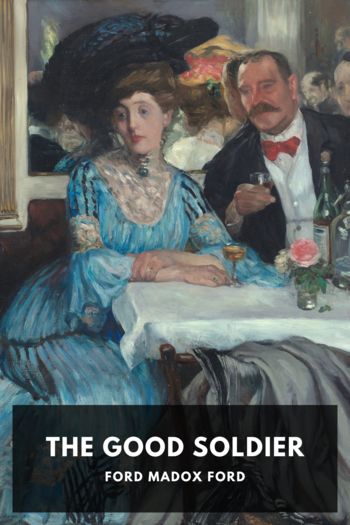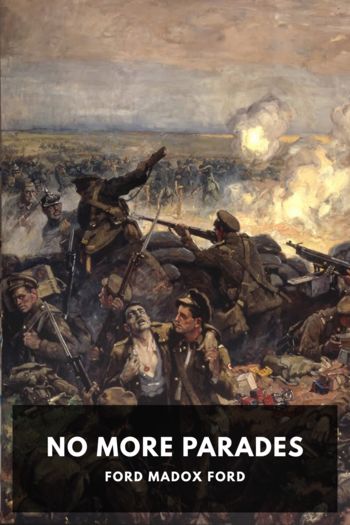The Good Soldier by Ford Madox Ford (top 10 ebook reader TXT) 📕

- Author: Ford Madox Ford
Book online «The Good Soldier by Ford Madox Ford (top 10 ebook reader TXT) 📕». Author Ford Madox Ford
Immediately after Florence’s death Leonora began to put the leash upon Nancy Rufford and Edward. She had guessed what had happened under the trees near the Casino. They stayed at Nauheim some weeks after I went, and Leonora has told me that that was the most deadly time of her existence. It seemed like a long, silent duel with invisible weapons, so she said. And it was rendered all the more difficult by the girl’s entire innocence. For Nancy was always trying to go off alone with Edward—as she had been doing all her life, whenever she was home for holidays. She just wanted him to say nice things to her again.
You see, the position was extremely complicated. It was as complicated as it well could be, along delicate lines. There was the complication caused by the fact that Edward and Leonora never spoke to each other except when other people were present. Then, as I have said, their demeanours were quite perfect. There was the complication caused by the girl’s entire innocence; there was the further complication that both Edward and Leonora really regarded the girl as their daughter. Or it might be more precise to say that they regarded her as being Leonora’s daughter. And Nancy was a queer girl; it is very difficult to describe her to you.
She was tall and strikingly thin; she had a tortured mouth, agonized eyes, and a quite extraordinary sense of fun. You, might put it that at times she was exceedingly grotesque and at times extraordinarily beautiful. Why, she had the heaviest head of black hair that I have ever come across; I used to wonder how she could bear the weight of it. She was just over twenty-one and at times she seemed as old as the hills, at times not much more than sixteen. At one moment she would be talking of the lives of the saints and at the next she would be tumbling all over the lawn with the St. Bernard puppy. She could ride to hounds like a Maenad and she could sit for hours perfectly still, steeping handkerchief after handkerchief in vinegar when Leonora had one of her headaches. She was, in short, a miracle of patience who could be almost miraculously impatient. It was, no doubt, the convent training that effected that. I remember that one of her letters to me, when she was about sixteen, ran something like:
“On Corpus Christi”—or it may have been some other saint’s day, I cannot keep these things in my head—“our school played Roehampton at Hockey. And, seeing that our side was losing, being three goals to one against us at halftime, we retired into the chapel and prayed for victory. We won by five goals to three.” And I remember that she seemed to describe afterwards a sort of saturnalia. Apparently, when the victorious fifteen or eleven came into the refectory for supper, the whole school jumped upon the tables and cheered and broke the chairs on the floor and smashed the crockery—for a given time, until the Reverend Mother rang a hand-bell. That is of course the Catholic tradition—saturnalia that can end in a moment, like the crack of a whip. I don’t, of course, like the tradition, but I am bound to say that it gave Nancy—or at any rate Nancy had—a sense of rectitude that I have never seen surpassed. It was a thing like a knife that looked out of her eyes and that spoke with her voice, just now and then. It positively frightened me. I suppose that I was almost afraid to be in a world where there could be so fine a standard. I remember when she was about fifteen or sixteen on going back to the convent I once gave her a couple of English sovereigns as a tip. She thanked me in a peculiarly heartfelt way, saying that it would come in extremely handy. I asked her why and she explained. There was a rule at the school that the pupils were not to speak when they walked through the garden from the chapel to the refectory. And, since this rule appeared to be idiotic and arbitrary, she broke it on purpose day after day. In the evening the children were all asked if they had committed any faults during the day, and every evening Nancy confessed that she had broken this particular rule. It cost her sixpence a time, that being the fine attached to the offence. Just for the information I asked her why she always confessed, and she answered in these exact words:
“Oh, well, the girls of the Holy Child have always been noted for their truthfulness. It’s a beastly bore, but I’ve got to do it.”
I dare say that the miserable nature of her childhood, coming before the mixture of saturnalia and discipline that was her convent life, added something to her queernesses. Her father was a violent madman of a fellow, a major of one of what I believe are called the Highland regiments. He didn’t drink, but he had an ungovernable temper, and the first thing that Nancy could remember was seeing her father strike her mother with his clenched fist so that her mother fell over sideways from the breakfast-table and lay motionless. The mother was no doubt an irritating woman and the privates of that regiment appeared to have been irritating, too, so that the house was a place of outcries and perpetual disturbances. Mrs. Rufford was Leonora’s dearest friend and Leonora could be cutting enough at times. But I fancy she was as nothing to Mrs. Rufford. The Major would come in to lunch harassed and already spitting out oaths after an unsatisfactory morning’s drilling of his stubborn men beneath a hot sun. And then Mrs. Rufford would make some cutting remark and pandemonium would break loose. Once, when she had been about twelve, Nancy had tried to intervene between





Comments (0)